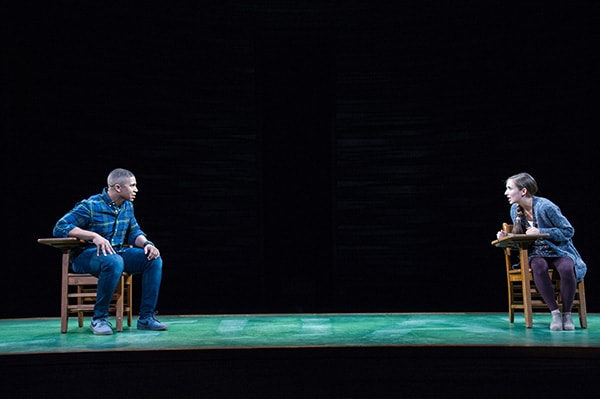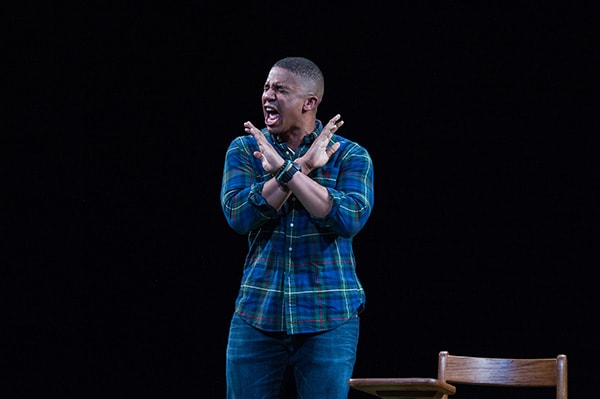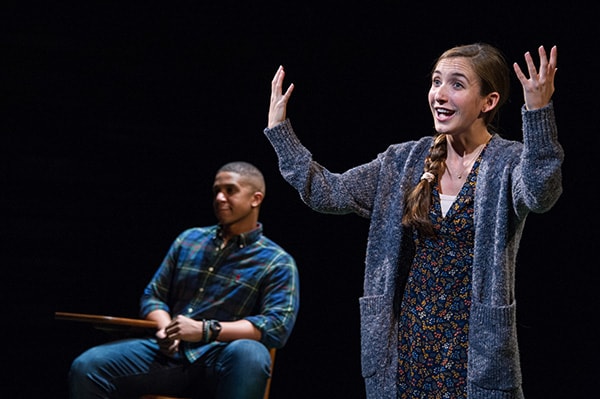The vexing concept of consent in sex gets a seductively smart parsing in Anna Ziegler’s Actually. Now playing in an electrically well-acted Theater J production directed by Johanna Greunhut, Actually zeros in on the zeitgeist like a heat-seeking laser.
Ziegler sets up a riveting he-said/she-said narrative about two first-year Princeton students who after a night of heavy drinking have sex in his dorm room. Later she reports it as rape and the case goes before the school’s Title IX board.

Ambivalence and ambiguity are everywhere.
She tells us her “default state” is
This zone of wanting something and not wanting it at the same time.
He says
We were drunk. She was into it… And if she wasn’t into it at some point…well then my body, my brain, convinced me she was. I wasn’t knowingly…I didn’t do anything knowingly…I know that.
We watch and listen raptly trying to track exactly what happened that alcohol-fueled night. We learn they met in a bar. She thought he was hot; he thought she was hot too. When he invited her back to his room, she went willingly, and she got into his bed willingly. He did not force her to have sex but during it “he got a tiny bit rough” and then she “wasn’t into it anymore” and she stopped and she said, “Actually, um.”
So was the sex they had rape?

Click to read my colleague Beatrice Loayza’s incisive review.
The suspense unspools as we learn who these two people are. Tom, who says he parties and has sex every night, is black and comes from poverty. Amber, also practiced in partying and having sex, is white and comes from wealth. Ziegler thus calibrates her characters’ sex, race, and class to place them on a playing field as level as possible given the societal imbalance between men and women.
Jason Wright’s performance as Tom is charismatic. From the endearing charm he exudes at the beginning, to his playfulness when they meet cute, to his howl of anguish when he stands accused, Wright’s stature as an actor becomes augmented before our eyes. In Sylvia Kates’s arrestingly mercurial performance as Amber, we see a complexity of boldness and self-doubt, of fortitude and nerves—even as all the while her acute mind is racing a mile a minute. “God, do you ever stop talking?” Tom asks Amber at one point—gently and very much smitten.

So was what happened that night what they both wanted to happen, or only what he wanted to happen?
Actually’s ending comes as a breathtaking surprise, but before then its storyline steadily teases out a fundamental problem with the notion of consent: Women give consent and men try to get it. Men are the horndogs and women are the gatekeepers. Men drive and women yield. Men are the potential perps and women the potential pushovers. As Actually vividly dramatizes, this lopsided notion of consent puts both the man and the woman into impossible boxes.
So-called affirmative consent—the practice of actively, mutually soliciting enthusiasm throughout a sexual encounter—is now the legal standard for universities in some states. But it is an ideal better expressed on paper than in real-life hookups. Certainly such consistent clear-channel communication never occurs to Tom and Amber—though a condom is not forgotten.
A lot of he-said/she-said questions arise after the fact because he-wants/she-wants questions did not get asked earlier—a dilemma that Tom’s and Amber’s story presents as made-up drama but that’s all over in real life.
So how exactly are two people ever to know for certain that what is happening between them sexually is not merely acquiesced to but mutually and enthusiastically wanted in an equilibrium of self-possessed agency?
Well, actually…
Go see this play and go figure.
Running Time: 90 minutes, with no intermission.
Actually plays through November 18, 2018, and (because Theater J is “around town” this season while the Edlavitch DCJCC undergoes renovation) performances are at Arena Stage in the Kogod Cradle — 1101 6th Street SW, Washington, DC. For tickets call the box office at 202-777-3210 (1-4 pm, Monday through Friday) or go online.
Note: Theater J’s box office and Will Call will be located outside Arena’s Kogod Cradle on the second level beginning one hour before each performance.




